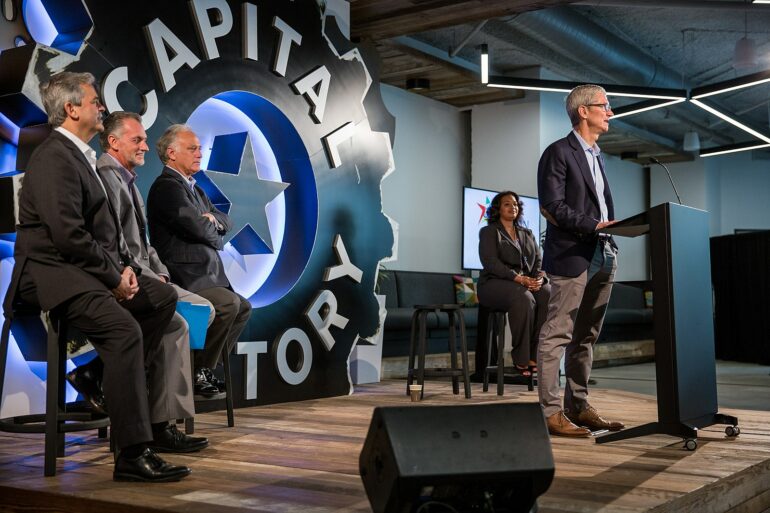While attending the high-profile China Development Forum in Beijing over the weekend, Apple CEO Tim Cook said that the enormous tech company that holds a majority of the smartphone market in the United States and communist China were “symbiotic.”
The comments raised eyebrows among tech watchers. Apple has been working to move production out of China following supply chain issues that gripped the country as it practiced its Zero Covid policy.
The Financial Times noted that Tim Cook has praised Apple’s symbiotic relationship with China despite rising trade and geopolitical tensions between Beijing and the US, and the iPhone maker’s own moves to diversify from the country.
In his first visit to China since the pandemic began in 2020, the Apple chief said the company would this year celebrate its 30th anniversary in the country that makes the vast bulk of its iPhones.
“We could not be more excited,” Cook said at the China Development Forum in Beijing, the country’s version of Davos, which Beijing is holding offline for the first time since the pandemic began. “Apple and China . . . grew together and so this has been a symbiotic kind of relationship.”
In a sign of how positively the US technology company continues to be viewed in what is also one of its biggest markets, Cook’s trip was covered by China’s state media while customers in the group’s flagship store in Beijing broke into applause when he visited the shop on Friday.
Yahoo reported, “Last year, Apple sales were hit by curtailed production at factories as a result of China’s zero-Covid policy.
US export controls on high-tech components are also threatening the company’s supply chain. Cook did not address supply chain issues during his discussion.
Instead, he focused on the need to bridge the education gap between urban and rural schools and encouraged young people to learn programming and critical thinking skills.
He also pledged to increase Apple’s spending on its rural education program in China to 100 million yuan ($15 million).”
Apple has faced big trouble over the past couple years for tying itself to the CCP.
“Turmoil at a place called iPhone City helped propel Apple’s shift. At the giant city-within-a-city in Zhengzhou, China, as many as 300,000 workers work at a factory run by Foxconn to make iPhones and other Apple products. At one point, it alone made about 85% of the Pro lineup of iPhones, according to market-research firm Counterpoint Research.
The Zhengzhou factory was convulsed in late November by violent protests. In videos posted online, workers upset about wages and Covid-19 restrictions could be seen throwing items and shouting “Stand up for your rights!” Riot police were present, the videos show. The location of one of the videos was verified by the news agency and video-verification service Storyful. The Wall Street Journal corroborated events shown in the videos with workers at the site.
Coming after a year of events that weakened China’s status as a stable manufacturing center, the upheaval means Apple no longer feels comfortable having so much of its business tied up in one place, according to analysts and people in the Apple supply chain.
‘In the past, people didn’t pay attention to concentration risks,’ said Alan Yeung, a former U.S. executive for Foxconn. ‘Free trade was the norm and things were very predictable. Now we’ve entered a new world,’” wrote The Wall Street Journal.
Last winter, Apple announced it would begin making Macbooks in Vietnam in 2023. The computer company produces around 20 million to 24 million MacBooks each year.
[Read More: Moody’s: Prepare For More Economic Problems]



